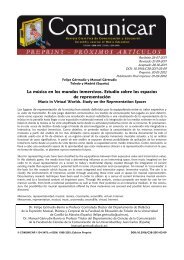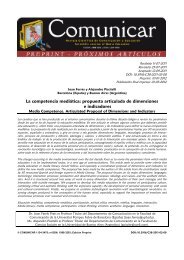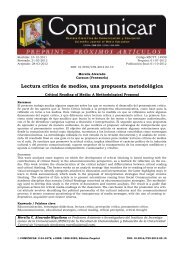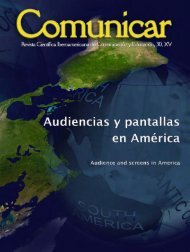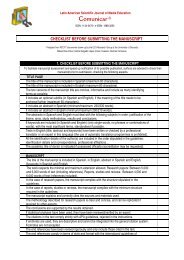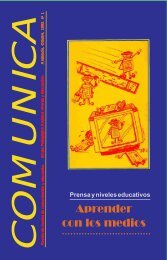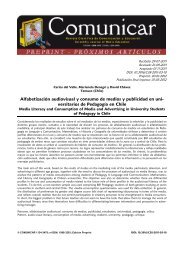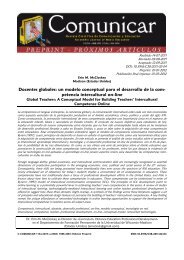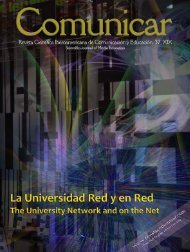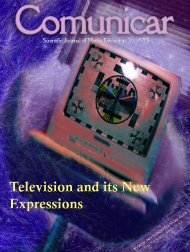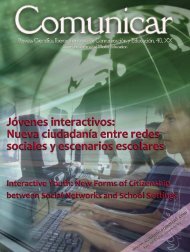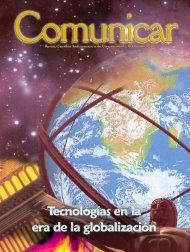Comunicar 39-ingles - Revista Comunicar
Comunicar 39-ingles - Revista Comunicar
Comunicar 39-ingles - Revista Comunicar
You also want an ePaper? Increase the reach of your titles
YUMPU automatically turns print PDFs into web optimized ePapers that Google loves.
197More and more elderly people are getting involvedin information technology, which shows that it is possibleto learn at any age and that their will to continuelearning means that education is not limited to specificstages of life. To learn is to live, and learning fosterscreativity, increases self-esteem, exercises the mind,etc. This is a guideline to consider when promotingthe positive aspects of aging. In the words of Belando(2000: 37), quoted by Limón and Crespo (2001: 302-305), it is necessary «to look for new goals, new reasonsfor satisfaction and pride, a means to achievehappiness in this stage of life. Anchoring oneself in thepast will only restrain development and acceleratedecrepitude». Setting oneself the challenge to learnsomething new, in this case handling ICT, is a challenge,a new goal.Simply learning to use the keyboard and the mousemeans the acquisition of new skills. The functionsrequire coordination, agility and natural automatismachieved through learning, as in handling the mouse,which requires correct and comfortable usage in a flowingbut simultaneously paused movement, with theappropriate pressure applied to click on the left or rightbutton, and control to drag anddrop elements. Correct use ofthe keyboard requires the user topress specific keys, locate letters,manage cursors, find symbols, inshort, it requires the developmentof different degrees of pressureand coordinated movements.The data analysis confirmsthat the elderly generally attendICT-related face-to-face coursesand workshops specifically orientedtowards their needs, as part of educational plansfor senior citizens run by regional governments or citycouncils.In response to the question «how did you learn touse ICT?» 60% indicated computer science coursesand workshops; «where?» yielded a 96.7% responsein favor of social centres for the elderly.It is noteworthy that 29.6% of the elderly state thatthey use the Internet for educational purposes. Theresults from the χ2 test indicate that there is no significantassociation for age [χ2(12)=10.977, p>.05],marital status [χ2(9)=7.760, p>.05], place of residence[χ2(6) 9.717, p>.05], type of cohabitation [χ2(3)=6.113, p>.05], gender or level of education, asseen in Graph 2.The data show that women carry out this activityon the Internet to a lesser extent than men, with thegreatest contrast between both sexes at the level ofsecondary school education.3.2.2. InformationAccess to information is another of the commonuses that the elderly make of ICT which is unsurprisingwhen referring to the Information Society we livein (Castells, 1995). Information is now an essentialresource for human activity, both socially and personally,and the elderly, as part of our society, also perceivecomputer science to be one of the great historicalrevolutions. «There is absolutely no doubt... computerscience is, I believe, one of the most important revolutionsof human life. Why? Because it has united theworld. That is true globalization […]. And I alwayslike to be involved in non-violent revolutions… andthen I got very interested in everything that it can offerme. Above all, information. I have access to immediate,trustworthy information when I know how to lookfor it and use it, and I am using it every day. Then theadvantage is immense… it expands knowledge, theconsciousness, and that is what we need […]» (H).Graph 2. Elderly people who use the Internet for educational purposes accordingto level of education and gender.The Internet constitutes an immense source ofinformation of all kinds: texts, photographs, graphics,music, videos, animations, computer science programs,etc., all stored on PCs connected to the Netand structured in diverse formats, such as Web pages,files, discussion forums, noticeboards, etc. Miranda deLarra (2004: 21) indicates that the elderly are generallyinterested in the same subjects as the rest of thepopulation, but also in information with special relevancefor their stage of life (pension payments, health,etc.), hence they demand that this type of informationbe made more and more accessible on the Internet.Electronic transactions are particularly useful for theelderly who are restricted by poor health or physicaldisability. The same applies to online shopping andbanking for those with mobility restrictions or limited<strong>Comunicar</strong>, <strong>39</strong>, XX, 2012© ISSN: 1134-3478 • e-ISSN: 1988-3293• Pages 193-201



